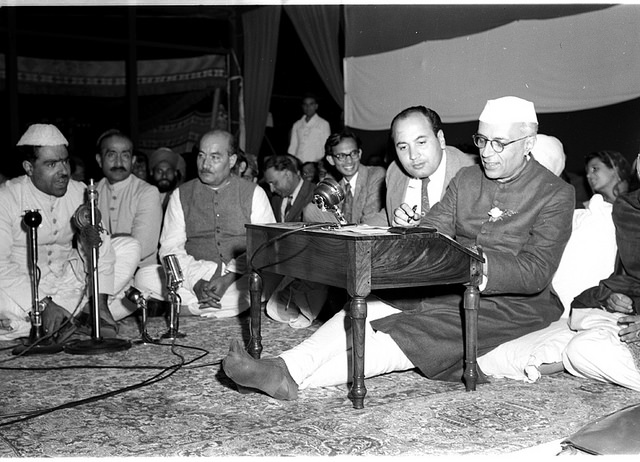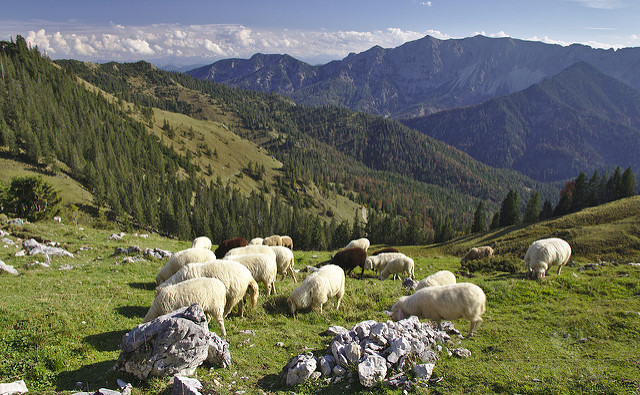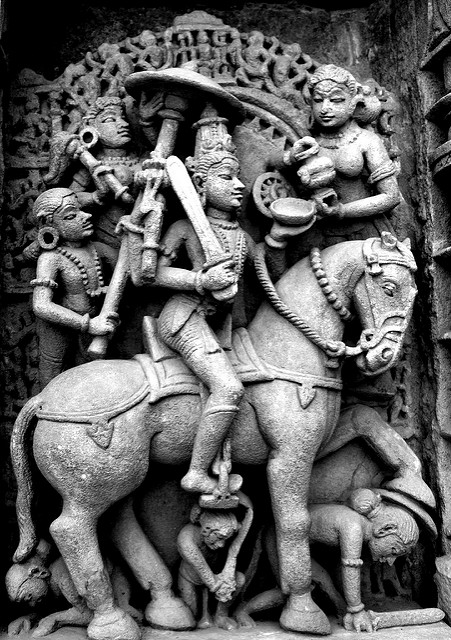Kaifi Azmi’s “The Son of Mary” (Part 2) Posted by Rachael on Mar 28, 2018 in Uncategorized
This week, I will go into more depth with the poem we discussed last time: “The Son of Mary” (ابنِ مریم) by renowned poet and lyricist Kaifi Azmi (کیفی عظمی). In this second half of the poem, Azmi’s tone becomes progressively more intense and combative, as you’ll see in the following lines. Comment below if you liked/disliked the poem and why! Bonus points for those who attempt to parse its meaning (especially if your comment is in Urdu) 🙂
ابنِ مریم (Part 2)
|
تم یہاں کیوں کھڑے ہو مدت سے |
Tum yahaan kyoon khare ho muddat se |
Why do you stand here, endlessly? |
|
یہ تمہاری تھکی تھکی بھیڑیں |
Yeh tumhaari thaki thaki bheren |
These are your weary sheep |
|
رات جن کو زمیں کے سینے پر |
Raat jin ko zameen ke seene par |
When the morning dawns (these two lines are switched) |
|
صبح ہوتے اںڈیل دیتی ہے |
Subah hote undhel deti hai |
The night expels them onto the breast of the earth |
| منڈیوں، دفتروں ملوں کی طرف |
Mandiyon, daftaron, milon ki taraf |
Toward the markets, offices, mills |
| ہاںک دیتی دھکیل دیتی ہے |
Haank deti dhakel deti hai |
They shout, they jostle |
| راستے میں ہے رک نہیں سکتیں |
Raaste men ye ruk nahin saktin |
They could not halt on the path |
| توڑ کہ گھٹنے جھک نہیں سکتیں |
Tor ke ghutne jhuk nahin saktin |
Their broken knees could not bend |
|
ان سے تم کیا توقّوا رکھتے ہو |
Un se tum kyaa tavaqqoa rakhte ho |
What faith do you have in them? |
|
بھیڑیا ان کے ساتھ چلتا ہے |
Bhediyaa un ke saath chalta hai |
A wolf in sheep’s clothing* runs among them |
|
⚜ |
⚜ |
⚜ |
|
تکتے رہتے ہو اس سڑک کی طرف |
Takte rehte ho is sarak ki taraf |
You remain, staring at this street |
|
دفن جن میں کیٴ کہانیاں ہیں |
Dafn jin men kai kahaaniyaan hain |
In which many stories are entombed |
| دفن جن میں کیٴ جوانیاں ہیں |
Dafn jin me kai javaaniyan hain |
In which many youths are buried |
| جس پہ اک ساتھ بھاگی پھرتی ہیں |
Jis pe ik saath bhaagi phirti hain |
On which empty pockets and coffers, too (this and the line below it are slightly switched) |
|
خالی جیبیں بھی اور تجوریاں بھی |
Khaali jeben bhi aur tijoriyaan bhi |
Flee and scatter at once |
|
جانے کس کا ہے انتظار تمہیں |
Jaane kis kaa hai intezaar tumhen |
God only knows* who you’re waiting for |
| ⚜ | ⚜ | ⚜ |
|
مجھ کو دیکھو کہ میں وہی تو ہوں |
Mujh ko dekho ke main vahi to huun |
Behold, for I am he |
|
جس کو کوڑوں کی چھاوٴں میں دنیا |
Jis ko kooron ki chhaaon mein duniyaa |
He, whom the world, in the shadow of filth |
|
بیچتی بھی خریدتی بھی تھی |
Bechti bhi khareedti bhi thi |
Bought in one breath, sold in the other |
|
مجھ کو دیکھو کہ میں وہی تو ہوں |
Mujh ko dekho ke main vahi to huun |
Behold, for I am he |
| جس کو کھیتوں سے ایسے باںدھنا تھا |
Jis ko kheton se aise baandhnaa thaa |
To whom fields* were bound as if |
| جیسے میں ان کا اک حصہ تھا |
Jaise main un kaa ik hissa thaa |
I were a part of them |
|
کھیت بکتے تو میں بھی بکتا تھا |
Khet bikte to main bhi biktaa thaa |
If the field was sold, I too was traded |
|
مجھ کو دیکھو کہ میں وہی تو ہوں |
Mujh ko dekho ke main vahi to huun |
Behold, for I am he: |
|
کچھ مسینیں بنایٴں جب میں نے |
Kuch masheenen banaayin jab main ne |
I built machines |
|
ان مسینوں کے مالکوں نے مجھے |
Un masheenon ke maalikon ne mujhe |
When the masters of those machines |
|
بے جھجک ان میں ایسے جھوںک دیا |
Be jhijhak un mein aise jhonk diyaa |
Threw me in to stoke the flames, without a thought |
| جیسے میں کچھ نہیں ہوں ایںدھن ہوں |
Jaise main kuch nahin huun, indhan huun |
As if I were nothing but fuel |
| مجھ کو دیکھو کہ میں تھکا ہارا |
Mujh ko dekho ke main thakaa haaraa |
Behold, for I am weary, defeated |
| پھر رہا ہوں جگوں سے آوارہ |
Phir rahaa huun jugon se aawaarah |
I have been wandering, nomadic, for ages* |
|
تم یہاں سے ہٹو تو آج کی رات |
Tum yahaan se hato to aaj ki raat |
If you leave tonight… |
| سو رہوں میں اسی چبوترے پر |
So rahoon main isi chabootare par |
I will remain, sleeping, on this platform |
|
⚜ |
⚜ | ⚜ |
|
تم یہاں سے ہٹو خدا کے لیےٴ |
Tum yahaan se hato khudaa ke liye |
Leave, for God’s sake |
| جاوٴ وہ ویتنام کے جںگل |
Jaao voh Vietnam ke jangal |
Go into those jungles of Vietnam* |
|
اس کے مصلوب شہر زخمی گاوٴں |
Is ke masloob sheher, zakhmi gaav |
Its crucified cities, its wounded villages |
|
جن کو انجیل پڑھنے والوں نے |
Jin ko injel parhne vaalon ne |
That those bible beaters |
|
روںد ڈالا ہے پھوںک ڈالا ہے |
Raund daalaa hai phuunk daala hai |
Laid to waste, set aflame |
|
جانے کب سے پکارتے ہیں تمہیں |
Jaane kab se pukaarte hain tumhen |
God knows how long they have been calling out for you |
| جاوٴ اک بار پھر ہمارے لیےٴ |
Jaao ik baar phir humaare liye |
Go, once more, for us: |
| تم کو چڑھنا پڑےگا سولی پر | Tum ko charnaa paregaa sooli par |
This time, you will ascend the gallows* |
Notes:
- بھیڑیا/Bheriyaa: Literally, this means wolf but it can also mean “sheep-like” or “disguised as a sheep” with the implication (as in English) that this creature is seemingly harmless but, in reality, dangerous and duplicitous.
- جانے کس کا…/Jaane kis kaa: This phrase occurs several times throughout the poem. It is a very common phrase in Urdu that means something like “Who knows” or “I wonder.” But, in English, a colloquial variant of this is “God only knows,” which I chose to substitute each time this phrase is used in the poem as I felt the diction tied in to the poem’s message.
- کھیت/Khet: Usually, this word means “field,” but it can also connote the crops or harvest from that field or a farm or land in itself. In this poem, the word is a bit ambiguous in that it can mean landed property that belongs to someone and/or borders drawn between nation states, both of which are arbitrary, unnatural divisions that often result in invocations of God and bloodshed.
- جگ/Jug: A variant of the Sanskrit “yuga,” this phrase denotes an endless succession of epochs during which certain qualities reign supreme. Generally, in this four-stage schema of time, the yugas become progressively more negative as time wears on. For example, we are now in the “Kali Yuga,” meaning the darkest time of humanity during which suffering and scarcity can be extreme. The idea is that a messiah (a concept common to many religions) in the form of an avatar of the god Vishnu, Kalki (lit. means “Destroyer of Filth,”) will appear riding or leading a white horse with a flaming sword in hand; he will then usher in another “Satya Yuga” or Era of Truth, the time period that occurs first in this cycle.
- ویتنام/Vietnam: Here, Azmi refers to the American “Vietnam War.” A very controversial war then and now, Azmi draws attention to the irony between the “bible beaters'” faith, which encourages them to be kind and forgiving, and the needless bloodshed inflicted on Vietnamese citizens.
- سولی/Sooli: Or “gallows.” Earlier in the poem, you may remember, the narrator stated that those who are recognized as spiritual leaders in our society, without the presence of Jesus, would exist to serve humanity alone, rather than attempting to serve selfish spiritual aims aimed to curry favor in the after life. He states “after all, who ascends the gallows gladly?” If you want, you can debate what this statement means in the comments below!

Build vocabulary, practice pronunciation, and more with Transparent Language Online. Available anytime, anywhere, on any device.






